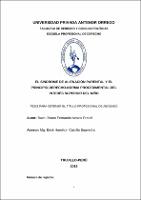Mostrar el registro sencillo del ítem
El síndrome de alienación parental y el principio-derecho-norma procedimental del interés superior del niño
| dc.contributor.advisor | Castillo Saavedra, Erick Hamilton | |
| dc.contributor.author | Avalos Pretell, Bruno Fernando | |
| dc.creator | Avalos Pretell, Bruno Fernando | |
| dc.date.accessioned | 2018-07-04T19:58:56Z | |
| dc.date.available | 2018-07-04T19:58:56Z | |
| dc.date.issued | 2018 | |
| dc.identifier.uri | https://hdl.handle.net/20.500.12759/4161 | |
| dc.description.abstract | La presente tesis se titula “El síndrome de alienación parental y el principio-derecho-norma procedimental del interés superior del niño”, la cual se ha orientado a determinar de qué manera la variación de la tenencia, sustentada en el síndrome de alienación parental, garantiza el interés superior de niño. En este sentido, el enunciado de mi problema es el siguiente: ¿De qué manera la variación de la tenencia, justificada en la existencia del síndrome de alienación parental, garantizará efectivamente la vigencia del principio-derecho-norma procedimental del interés superior del niño? Siendo su hipótesis de la siguiente manera: “La variación de la tenencia, justificada en la existencia del síndrome de alienación parental, garantizará efectivamente la vigencia del principio-derecho-norma procedimental del interés superior del niño si se encuentra regulada en el Código de los Niños y Adolescentes; a través de las medidas psicojurídicas pertinentes y los niveles de intensidad de la alienación parental”. Para analizar el problema se utilizaron métodos lógicos y jurídicos; en los primeros se ubican el analítico, deductivo, inductivo y sintético; mientras que, como métodos jurídicos, se emplearon el dogmático, hermenéutico y el comparativo. Las técnicas empleadas fueron el análisis bibliográfico, el análisis de documentos y las entrevistas; de este modo, los instrumentos fueron las fichas bibliográficas, la guía de análisis de documentos y la guía de entrevista. Los resultados más resaltantes se materializaron en el hecho que todos los entrevistados opinaron que la conducta del progenitor alienador es una causal para variar la tenencia a favor del padre rechazado y en que el interés superior del niño se garantiza si se tienen en cuenta los niveles de intensidad de la alienación parental. La conclusión más resaltante es aquella por la cual se establece que el principio-derecho-norma procedimental del interés superior del niño solo se garantizará si el juez tiene en cuenta los niveles de intensidad de la alienación parental para variar la tenencia y si se ordena que se lleve a cabo la medida psicojurídica permitente para restaurar las relaciones de afecto entre los alienados. | es_PE |
| dc.description.abstract | The thesis is entitled “Parental alienation syndrome and the procedural principle-law-rule of the best interests of the child”, which has been designed to determine how the variation of exclusive custody, based on parental alienation syndrome, guarantees the best interests of the child. In this sense, the statement of my problem is as follows: In what way will the variation of tenure, justified by the existence of parental alienation syndrome, effectively guarantee the validity of the procedural right-law-principle of the best interests of the child? The hypothesis is as follow: “The variation of cystody, justified by the existence of parental alienation syndrome, wull effectively guarantee the validity of the procedural principle-right-norm of the best interest of the child if it is regulated in the Children and Adolescents Code; theought the relevant psycho-legal measures anda the levels of intensity of parental alienation”. Logical and legal methods were used to analyze the problema; in the former, analytical, deductive, inductive and synthetic methods were used, while dogmatic, hermeneutical and comparative methods were used as legal methods. The techniques used were bibliographic analysis, document analysis and interviews; thus, the instruments used were bibliographic records, the document analysis guide and the interview guide. The most striking results were the fact that all the interviewees were of the opinion that the behaviour of the cohabiting parent is a reason for varying custody in favour of the alienated father and that the best interests of the child are guaranteed if the levels of intensity of parental alienation are taken into account. The most striking conclusion is that the principle of procedural law and regulation of the best interests of the child will only be guaranteed if the judge takes into account the levels of intensity of parental alienation in order to vary tenancy and if the permitting measure is ordered to restore affective relations between the alienated. | en_US |
| dc.description.uri | Tesis | es_PE |
| dc.format | application/pdf | es_PE |
| dc.language.iso | spa | es_PE |
| dc.publisher | Universidad Privada Antenor Orrego | es_PE |
| dc.relation.ispartofseries | T_DERE_411 | |
| dc.rights | info:eu-repo/semantics/openAccess | es_PE |
| dc.rights.uri | https://creativecommons.org/licenses/by/4.0/ | es_PE |
| dc.source | Universidad Privada Antenor Orrego | es_PE |
| dc.source | Repositorio Institucional - UPAO | es_PE |
| dc.subject | Síndrome de alienación parental | es_PE |
| dc.subject | Principio | es_PE |
| dc.subject | Derecho | es_PE |
| dc.subject | Norma procedimental | es_PE |
| dc.title | El síndrome de alienación parental y el principio-derecho-norma procedimental del interés superior del niño | es_PE |
| dc.type | info:eu-repo/semantics/bachelorThesis | es_PE |
| thesis.degree.level | Título Profesional | es_PE |
| thesis.degree.grantor | Universidad Privada Antenor Orrego. Facultad de Derecho y Ciencias Politicas | es_PE |
| thesis.degree.name | Abogado | es_PE |
| thesis.degree.discipline | Derecho | es_PE |
| dc.subject.ocde | https://purl.org/pe-repo/ocde/ford#5.05.00 | es_PE |
| renati.type | https://purl.org/pe-repo/renati/type#tesis | es_PE |
| renati.level | https://purl.org/pe-repo/renati/level#tituloProfesional | es_PE |
| renati.discipline | 421016 | es_PE |
| dc.publisher.country | PE | es_PE |
Ficheros en el ítem
Este ítem aparece en la(s) siguiente(s) colección(es)
-
Derecho [481]


